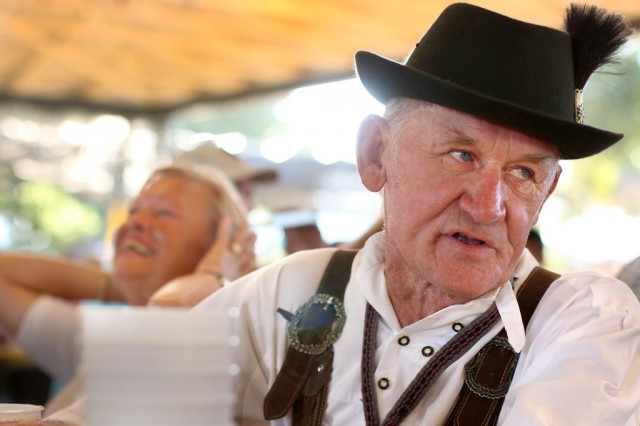‘Der Cowboy’ Riding into the Sunset

Towns such as Fredericksburg celebrate their German roots. Wilfred and Rose Marie Mazanke have volunteered for 16 years at Fredericksburg’s Oktoberfest, which includes food, German beer and oompah music. Photo by Thalia Juarez/Reporting Texas
By Elizabeth Williams
For Reporting Texas and the Austin American-Statesman
Dorothy Schneider grew up on a farm in Zorn, about 13 miles north of Seguin and didn’t speak much English until she started school. She was raised speaking Texas German, a mix of several German dialects and a smattering of English that flourished in Texas Hill Country for nearly 200 years.
Today, the 77-year-old, whose fraternal grandparents were German, rarely gets to talk in her first language. “It’s fading away,” said Schneider, who sews traditional German dresses for a hobby and polka dances for fun with a partner who speaks Texas German. “I’m just about the only one who speaks a lot of (Texas) German out here.”
Almost 3 million Texans claim German ancestry but there are only 6,000 to 8,000 Texas German speakers left, said Hans Boas, a professor of German linguistics at the University of Texas at Austin, who has created an online archive of the dialect.
Boas fears it will die out in another generation, joining the 90 percent of the world’s 7,000 languages that experts say will become extinct by 2050.
Texas German is spoken mostly at social gatherings and at home. About 5 to 6 percent of its vocabulary is English words fit into the German language to create expressions such as “der cowboy” and “der hamburger.” It also uses English grammatical constructions.
Some words are slightly different in Texas German compared with standard German, or have slightly different meanings. For example, a skunk is “die Stinkkatze” in Texas German and “das Stinktier” in standard German. An airplane is “das Luftschiff,” or airship, in Texas German and “das Flugzeug” in standard German.
German immigrants began settling in Texas during the 1830s. Towns such as New Braunfels and Fredericksburg are known for their German roots and have a concentration of the 11 percent of Texans who claim pure or partial German ancestry.
German-language newspapers and churches once were common in such towns. There even were schools that taught in Texas German until World War I, when anti-German sentiment spread across the country and state officials declared English as the official language of instruction. Two laws were passed but not enforced in the 1890s and early 1900s. But a 1917 law was enforced.
“A lot of the Texas German parents decided not to speak it at home any more because they didn’t want kids to grow up speaking this language that’s associated with the enemy,” Boas said. Churches and German-language newspapers switched to English or shut down.
Anne Stewart, a historian from Comfort, traces her German Texan roots to the 1850s. But the Texas German dialect was not passed on in her family.
“My grandfather was a German and he said, ‘We’re Americans and we’re not going to speak German except at home, at the table, and I don’t want any of my grandchildren speaking German,’” Stewart said.
Schneider, however, taught her children Texas German at home and is now trying to teach her grandchildren as well. “I have a lot of friends, even cousins, who did not pass on the language to their children, and that’s what they regret now,” she said. “I’m glad to share my first language with whoever wants to hear.”
Boas, the linguistics professor, discovered Texas German when he overheard a conversation at a Hill Country restaurant in 2001. “It sounded like a mix of different German dialects with a heavy dose of English infused,” he said.
He asked the group where they were from and was surprised to learn that they were Texans.
After returning to Austin, he started the Texas German Dialect Project to preserve a record of the dialect. He interviews Texas German speakers about their lives, translates the interviews and adds the transcripts to the archive. Over the years, he has interviewed more than 400 speakers.
Studies by Glenn Gilbert of Southern Illinois University Carbondale and Fred Eikel of Johns Hopkins University, conducted from the 1950s to the 1970s, provided English translations for lists of Texas-German words, phrases and sentences.
Boas said his mission is not simply to record the language. He is documenting an oral history of significant collective events, such as a particularly bad hailstorm in 1946 or the day that state officials banned the use of German in schools. The project also digitizes photographs, diaries and newspaper clippings in order to preserve the collective memory of German Texans.
“I think this is literally the last unique opportunity to capture the whole linguistic, cultural, folklore memory of this group of people who has had so much influence in settling and developing Texas,” he said.
The project initially was supported by university endowment funds. But the money dried up after seven years. Now, it is up to private donors to keep it afloat. The shortage of money has reduced the number of interviews the group can conduct from eight a month to two, Boas said.
The project has become a race against time. Boas said 450 people are waiting to be interviewed. Many of the prospective interviewees are in their 80s or 90s, and Boas sometimes calls only to learn that the interviewees have died, taking the language with them.
“Once there are no more speakers, you have no chance of ever recovering anything,” Boas said. “If the last speakers die, you’re just out of luck.”